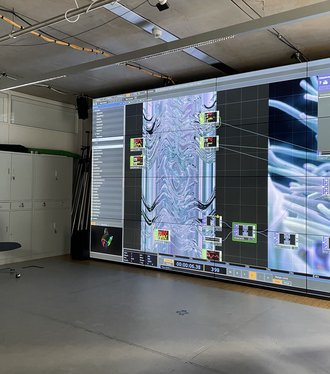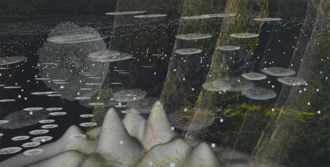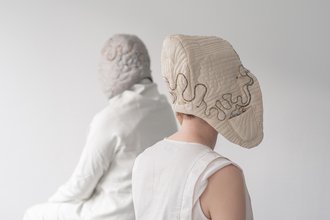Students and Teaching Staff Present Current Works at Ars Electronica 2022
With a total of six works from various artistic degree programmes at the Bauhaus-Universität Weimar, students and teaching staff will be presenting themselves at the renowned »Ars Electronica« media art festival in Linz from 7 to 11 September 2022. The installations, concerts and experiments were created in the »Media Art and Design« and »Media Architecture« degree programmes.
Participants’ work will be shown in the »Patterns That Connect« exhibit as part of the »Campus Exhibition« at Ars Electronica. The works to be presented allow planet Earth to be experienced through the senses as a shared environment, making coexistence with not only organisms but also machines practical and tangible.
In »Buffer Overflow the Mindframes!«, Media Art and Design students under the direction of Alexander König will present a live improvised audiovisual concert using abstract forms of visualisation and programming. The concert plays with pop cultural references of digital media of the early 2000s.
In his installation »Invisible Land«, Bo Liu uses photogrammetry and augmented reality to present a form of shared habitat filled with lichen from Weimar. From a human perspective, the lichen looks so »ordinary« in its natural environment that it is easily overlooked. In reality, however, the biocoenosis of fungi and algae as well as bacteria plays an important role in the environment and acts as an indicator of air pollution. Through this work, Liu aims to raise awareness of our habitats and the need to protect biodiversity.
»Homesick« by Dahye Seo is an audio-visual installation which uses water from Anseong in Korea and from Weimar, the two cities where the artist currently lives, as its main material. The media artist records the movements of microbes in the water and transforms them in real time into sound data that follows an experimental musical notation, a musical script that graphically records musical parameters.
Leon-Etienne Kühr works with artificial intelligence (AI) in his work »Machine Culture«. In his piece, he positions two AIs into a dialogue, provoking a feedback loop. An image generated by the first AI is converted into text by a second AI. This in turn is translated back into a new image. The result is an AI feedback loop that converges and points to the hidden machine culture that persists through data and training.
Zeinab Rahimi tackles negative comments on social networks in »Let's Write Positive«. The Media Architecture student has created a media station where negative texts can be entered. The writer of the text receives direct feedback on the negativity value of their text. With her work, Rahimi hopes to encourage society to use more positive language.
In »You and I, You and Me«, Mindaugas Gapševičius and Maria Safronova Wahlström explore the possibilities of communication through electricity. With the help of clothing and accessories, the imperceptible connections between different actors are made tangible. The wearers' senses are stimulated and influenced by electrical impulses. The participatory event invites the audience to experience the environment in a different way by wearing jewellery, shoes and headgear.
Ars Electronica's »Campus-Exhibition« invites artists who are associated with an international university whose curriculum takes an innovative approach to teaching media art and media culture. The Bauhaus-Universität Weimar is regularly represented at the world-renowned media art festival by Prof. Ursula Damm from the Professorship of »Media Environments«.
Detailed information on the works exhibited by the Bauhaus-Universität Weimar can be found online at https://ars.electronica.art/planetb/de/patterns-that-connect/.
Participating artists: Alexander König and students, Bo Liu, Dahye Seo, Leon-Etienne Kühr, Zeinab Rahimi, Mindaugas Gapševičius, and Maria Safronova Wahlström.
Ars Electronica 2022
7 - 11 September 2022
University of Arts Linz
Hauptplatz 8, Groundfloor
4020 Linz (Austria)
https://ars.electronica.art/planetb
About »Ars Electronica«:
Ars Electronica has accompanied, anticipated and analysed the digital revolution, its origins, successes and aberrations since 1979. As a festival for art, technology and society, the cultural and social significance of new technical and scientific developments has always been in the foreground. In this year's event, »Welcome to Planet B - A different life is possible! But How?«, exhibitors are invited to embark on a challenging search for answers to the contradictions of our time.
If you have any questions, please contact Prof. Ursula Damm by e-mail at ursula.damm[at]uni-weimar.de and Mindaugas Gapševičius, artistic collaborator, at mindaugas.gapsevicius[at]uni-weimar.de.



